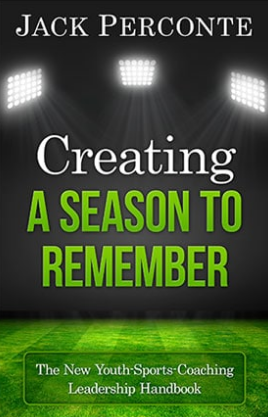Creating a Season to Remember: The New Youth-Sports-Coaching Leadership Handbook by Jack Perconte
July 9, 2017 by Jack Perconte · Leave a Comment
 Following is an excerpt from my new book, Creating a Season to Remember: The New Youth-Sports-Coaching Leadership Handbook. I am not sure there was an old handbook but I do know that the current state of youth sports coaching needs a makeover. In this segment, I show a common complaint from people about their coach. I follow that with an analysis of one of the many great coaches I study in the book. The ironic thing I found was that the issues the professional and college coaches face are the same ones as those youth coaches encounter. We can learn from the best.
Following is an excerpt from my new book, Creating a Season to Remember: The New Youth-Sports-Coaching Leadership Handbook. I am not sure there was an old handbook but I do know that the current state of youth sports coaching needs a makeover. In this segment, I show a common complaint from people about their coach. I follow that with an analysis of one of the many great coaches I study in the book. The ironic thing I found was that the issues the professional and college coaches face are the same ones as those youth coaches encounter. We can learn from the best.
Creating a Philosophy
Once committed to coaching, people must have values. That process begins with having the right goals and beliefs to implement the strategies needed for working with young athletes. Those beliefs are easier when a coach understands the realities of today’s youth sports atmosphere.
Here is a letter I received which attests to the extent some parents will go to have their child achieve success.
Coach, Since my son turned 2.5, I’ve had him on a routine of 500 swings per week Nov – Feb and 1,000 swings from Mar – Oct. He’s hit off a tee since he was 2 and I don’t mean chicken swinging, no leg movement, bat sagging. NONE of that… I’ve stressed perfect form since early on, reasoning as he ages, no pitcher will be able to break his sound fundamentals. I use a mix of Bob Knight and Mike Agassi, and he understands that it must be the correct way. I realize I might need a softer approach, but reason that it must be hard for him to have success, and I want a professional coach to work with him. Would you be willing to do so? I’m an all or nothing guy, and I’ve said this before that I’d rather have him win the batting title or tell me at age 10 I’m burnt out, but nothing in the middle. Do you think this is a good routine??? Don’t think I’m crazy but nobody his age has worked harder I can promise you that, and if you work with him, you won’t be disappointed as he’s used to 1 – 2 hour practices.
TONY DUNGY
I read a fascinating story about one of the superior coaches of this generation. ESPN’s Paul Kuharsky asked legendary football coach Tony Dungy if every once in a while he aired out his team as a form of motivation. He said, “No.” It’s amazing to think that Tony’s calm style worked even at the highest level of football, a sport that encourages aggressiveness.Tony Dungy doesn’t feel that’s a way to motivate teams. He went on to say that he appreciated his coaches who were not “yellers.” He noted the calm demeanor of Hall of Fame coach Chuck Noll of the Pittsburgh Steelers. Coach Dungy loved the calm explanations and felt that was the way to motivate.
Dungy doesn’t find that screaming, humiliating, and threatening are effective coaching strategies. Like the incomparable Coach John Wooden, Dungy believes in treating players the way he wants people to treat him. He is one of the few coaches who, unlike most coaches, never swears to make his coaching point. He reminds us that respect comes from remaining faithful to your philosophy. He shows us that leaders don’t have to be tyrants to get players to respond. They only have to be educators who want to and do help.
Lessons Learned from Coach Tony Dungy:
- 1. Treat athletes the way you would like others to treat you – with respect.
- 2. No matter the nature of the sport, using thoughtful ways to motivate, not ranting and raving, is best.
- 3. Swearing is not necessary or acceptable.
- 4. Threats and humiliation have no part in sports.

